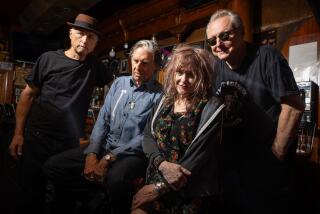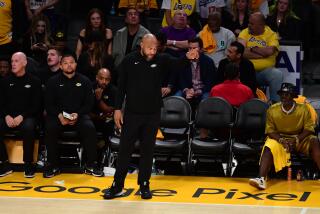Review: Hum and the unlikely second act of an alt-rock band at the Regent
- Share via
The band Hum is best known as a ‘90s footnote. Most alt-rock radio listeners might be hard-pressed to draw a distinction between the Champaign, Ill., band and Silverchair, Failure or any number of one-word guitar bands that were swept into the major label feeding frenzy of the post-grunge era.
These groups were maybe lucky enough to catch on with single radio hit (1995’s “Stars,” in Hum’s case), but typically ended their run with a quiet slide into cutout bin obscurity.
So why did Hum’s sold-out show at the Regent on Thursday night – the band’s first Los Angeles appearance in more than 15 years -- feel like a victory lap?
SIGN UP for the free Essential Arts & Culture newsletter >>
Mixing churning and often complex guitar textures and crisp melodies around lyrics steeped with science and space travel, Hum was too lyrically esoteric to be emo, too Midwestern clean-cut for metal and simply too late to get swept into the early ‘90s shoegaze scene.
The band’s major label debut, “You’d Prefer an Astronaut,” sold some 250,000 copies on the strength of “Stars,” and Hum released the more ambitious follow-up “Downward Is Heavenward” in 1998. A lost classic, the album disappeared on the sales charts, and Hum was eventually dropped from RCA. During Hum’s last West Coast tour that same year, a van accident resulted in canceled dates and, ultimately, the end of the band.
Meanwhile, Hum’s shadow grew far larger than its contemporaries. In a 2010 interview, the Deftones’ Chino Moreno cited Hum as a key influence, and you can hear echoes of the band’s textured yet heavy mix in buzzy recent metal favorites Deafheaven.
Lately, the band has existed only periodically, including a few festival dates in 2011, but this year marked its first cross-country tour since the ‘90s.
Onstage at the Regent, Hum looked roughly indistinguishable from its crowd -- an aesthetic true to the decade they came out of. Though today’s modern rock, such that it is, has moved well beyond the kind of down-to-earth authenticity of the alt-rock era (something that, inevitably, grew to become its own kind of artifice), there was something comforting about seeing that sort of onstage everyman again.
The band served as a loud, furiously efficient reminder that anyone who may otherwise pass by unnoticed on the street could become someone else entirely by conjuring a truly unholy racket onstage and, by extension, you could too. In the stratified, seen-it-all pop landscape of 2015, it’s an idea that seems as revolutionary as it is quaint.
Opening with the slow-burning, shimmering drone of “Little Dipper,” Hum’s set at the Regent revealed the ferocious metallic heart that’s long lurked beneath its sweet melodies and space-rock textures.
“Comin’ Home” accelerated through a relentless, bottom-heavy churn of guitars grounded by the even-keeled voice of lead singer/guitarist Matt Talbott, and “Isle of the Cheetah” rose through a grinding swirl of fuzz and noise from Talbott and fellow guitarist Tim Lash, which was offset by an arcing vocal melody that wouldn’t sound out of place on a Morrissey track.
“Iron Clad Lou” and “Scraper” from the band’s gruff 1993 album “Electra 2000” further underscored the group’s aggressive underpinnings, which prompted Talbott to sheepishly admit after a raw-throated conclusion that he really wasn’t that upset anymore. “I’d Like Your Hair Long” sped through a sparkling, off-kilter structure, and “Stars” flexed Hum’s deft hand with the quiet-loud dynamics that made the Pixies so influential, leading that band to some belated reunion runs in its own right.
Throughout the night Talbott – resembling a print shop manager with close-cropped hair and glasses bound to his head with an elastic strap – often seemed overwhelmed by the crowd’s warm reception during his few spoken interludes. “The Scientists” closed the evening with stutter-stop guitars and lyrics that, like many of Hum’s songs, reference mysterious technology and launch difficulties, broken by Talbott’s far-reaching, mid-song warning, “it’s too much, you’re too late.”
It’s nearly 20 years after the fact, but for at least one night, he was wrong.
Want to read more but 140-characters at a time? Follow me @chrisbarton.
MORE:
Lauryn Hill blurs the past, Nas brings it into focus at Greek Theatre
Keith Richards keeps Stones fans happy with ‘Crosseyed Heart’
Lady Gaga’s striking new video explores sexual assault on campus
More to Read
The biggest entertainment stories
Get our big stories about Hollywood, film, television, music, arts, culture and more right in your inbox as soon as they publish.
You may occasionally receive promotional content from the Los Angeles Times.











